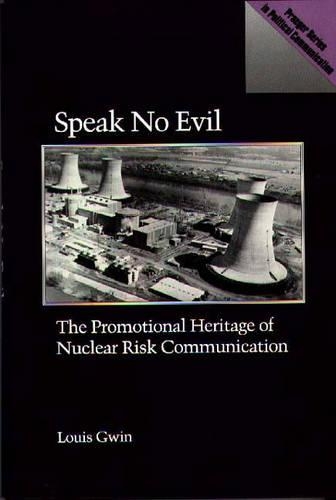
Speak No Evil: The Promotional Heritage of Nuclear Risk Communication
(Hardback)
Publishing Details
Speak No Evil: The Promotional Heritage of Nuclear Risk Communication
By (Author) Louis Gwin
Bloomsbury Publishing PLC
Praeger Publishers Inc
9th November 1990
United States
Classifications
Tertiary Education
Non Fiction
Nuclear issues
363.1799
Physical Properties
Hardback
200
Description
Are the nuclear industry's efforts to prepare the public during emergency situations adequate This study critiques risk communication programs and questions whether these programs have convinced residents close to nuclear power plants to follow instructions in an emergency. The government invests the responsibility of nuclear risk communication essentially with the utilities that operate the plants, with little supervision by either federal or state officials. The study demonstrates that such programs do not communicate critical safety information, that people living near plants will make decisions in an emergency contrary to those recommended, and that disparity exists between technical and lay perceptions of risk. A unique investigation of non-governmental public communication, the book analyzes the persuasive efforts of corporate advocacy and risk management. Risk communication is seen as a substitute for the more stringent regulatory measures necessary to protect public health and safety in a technological age. Speak No Evil begins with a discussion of issues surrounding risk communication, then describes how the narrative of the promotional history of nuclear power developed and eventually contaminated modern nuclear risk communication messages. Students of organizational communication, rhetoric, political communication, and public relations issue management will find this book illuminating.
Reviews
This book critiques the US nuclear power industry's public information campaigns since the mid-1950s. Gwin, a veteran public relations executive and communications professor at Virginia Polytechnic, also surveys public knowledge about possible responses to nuclear plant accidents. He finds that the public in communities with nearby nuclear power facilities is less prepared to react appropriately to nuclear plant accidents than the public in other areas. He notes that public relations campaigns in area with nuclear power plants engender comfort without always necessarily informing area residents how to respond to emergencies. The author does not discuss how the news media cover nuclear power or the scientific debate about the safety of nuclear power plants. But the book is a noteworthy exception to most public relations literature because it empirically explores the partial efficacy of a series of longstanding public relations campaigns. Gwin provides a succinct history of the nuclear power industry's public information efforts. Each chapter is carefully footnoted and statistical data are presented with a minimum of jargon. Gwin urges a better public dialogue about nuclear power information and safety, and he provides constructive suggestions to improve nuclear risk communication for government, industry and public interest organizations. A bonus is the excellent review of the sociology of risk assessment in the book's first chapter. The topic appeals to a range of interests including public safety, public relations, nuclear power, risk assessment, and public understanding of science, energy, and technology; Gwin's book is recommended for library collections in these areas.-Choice
"This book critiques the US nuclear power industry's public information campaigns since the mid-1950s. Gwin, a veteran public relations executive and communications professor at Virginia Polytechnic, also surveys public knowledge about possible responses to nuclear plant accidents. He finds that the public in communities with nearby nuclear power facilities is less prepared to react appropriately to nuclear plant accidents than the public in other areas. He notes that public relations campaigns in area with nuclear power plants engender comfort without always necessarily informing area residents how to respond to emergencies. The author does not discuss how the news media cover nuclear power or the scientific debate about the safety of nuclear power plants. But the book is a noteworthy exception to most public relations literature because it empirically explores the partial efficacy of a series of longstanding public relations campaigns. Gwin provides a succinct history of the nuclear power industry's public information efforts. Each chapter is carefully footnoted and statistical data are presented with a minimum of jargon. Gwin urges a better public dialogue about nuclear power information and safety, and he provides constructive suggestions to improve nuclear risk communication for government, industry and public interest organizations. A bonus is the excellent review of the sociology of risk assessment in the book's first chapter. The topic appeals to a range of interests including public safety, public relations, nuclear power, risk assessment, and public understanding of science, energy, and technology; Gwin's book is recommended for library collections in these areas."-Choice
Author Bio
LOUIS GWIN is an Associate Professor of Communication Studies at Virginia Polytechnic Institute and State University in Blacksburg. He previously worked in the Information Office of the Tennessee Valley Authority as Assistant Director of Information for Media Relations, where he was involved in communicating information about the agency's nuclear power program to the public and the news media.
